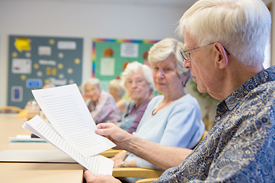In his first month of retirement, Stu Simon became an enthusiastic member of the Osher Lifelong Learning Institute at U-M.
“That experience has been one of the greatest sources of satisfaction in ‘the second half’ of my life. There are many opportunities to learn about interesting subjects I never had time for during my professional life. And equally important, chances to meet new people who also love to learn,” he says.

John Knott reads to his Writing Memoirs and Personal Essays classmates about his trip to the Galapagos Islands, during the recent Osher Lifelong Learning Institute session at the Turner Senior Resource Center. Photo by Austin Thomason, Michigan Photography.
OLLI, which has grown to include 1,280 members, celebrates its 25th anniversary this year. In honor of this milestone, OLLI was honored earlier this month by Gov. Rick Snyder and Ann Arbor Mayor John Hieftje.
Sponsored by the Geriatrics Center at the U-M Health System and the Bernard Osher Foundation, the U-M OLLI group — among the largest in the country — offers more than 180 volunteer-led educational, cultural and social activities each year to members ages 50 and older. There are 117 Osher groups nationwide, drawing on the resources of local universities.
Virginia Rezmierski, long time director of the Office of Policy Development and Education at U-M and current OLLI board member, remembers her introduction to the Osher Institute. She was asked to speak on computer security and ethics.
“I was shocked at the eagerness of the audience to learn and with their expertise. The room was filled with people wanting to know more, asking great questions, and offering more information than I had time to present myself. They are stimulated, stimulating, eager to be together, happy to delve into many diverse topics, ready to go on day trips to learn about even more from local events and organizations — organic farms, museum exhibits, the Detroit underground railroad and much more,” Rezmierski says, adding she soon joined OLLI.
“People in retirement don’t need to withdraw from society. They can maintain their roles as contributing members, and even take on new leadership roles. They can learn, stay active and involved with the issues in their community, and OLLI is a way to do so,” says Abbie Lawrence-Jacobson, OLLI program coordinator.
Members pay an annual $20 fee; they also pay fees to attend study groups (small classes), lecture series which attract between 250-300 attendees each week, and trips. Speakers volunteer their time to lead study groups or give lectures on topics ranging from creative writing to world culture to space exploration to politics.
“We draw upon the talents of many faculty to serve as speakers in our lecture series,” Lawrence-Jacobson says. A 25-member committee settles on the themes to be offered via lectures, and another large committee recruits leaders for the smaller study groups. Lecture speakers and study group instructors are not paid.
Among the most popular classes are Writing Memoirs and Personal Essays, in which students learn so much about each other through writings that they become like family, and the National Issues discussion group. These classes are popular because they require active participation. “Members are not just passive recipients of an instructor’s knowledge, they share in the learning process,” Lawrence-Jacobson says. “The heart of OLLI is about finding something that ignites you and then following that passion, whether as a leader of a study group or as an active participant,” she adds.
New programs this fall include a lecture series on “Europe in Crisis: Issues Behind the Headlines,” a study group on race and the Constitution led by former Law School Dean Terrance Sandalow, Edson R. Sunderland professor emeritus of law; and a post presidential election “Distinguished Lecture” led by Michael Traugott, professor of communication studies and political science, LSA, and research professor, Center for Political Studies, Institute for Social Research.
“One of the nicest things about OLLI is that it gives participants an ability to create a new social network, a new peer group to make friendships and provide support,” Lawrence-Jacobson says. “Even those who may be feeling a bit depressed or grieving the loss of a loved one find a way to bring themselves to OLLI classes or lectures, and find solace in a supportive community who gathers together to help one another, such as by bringing meals, sending cards, providing a ride when needed,” she says.

